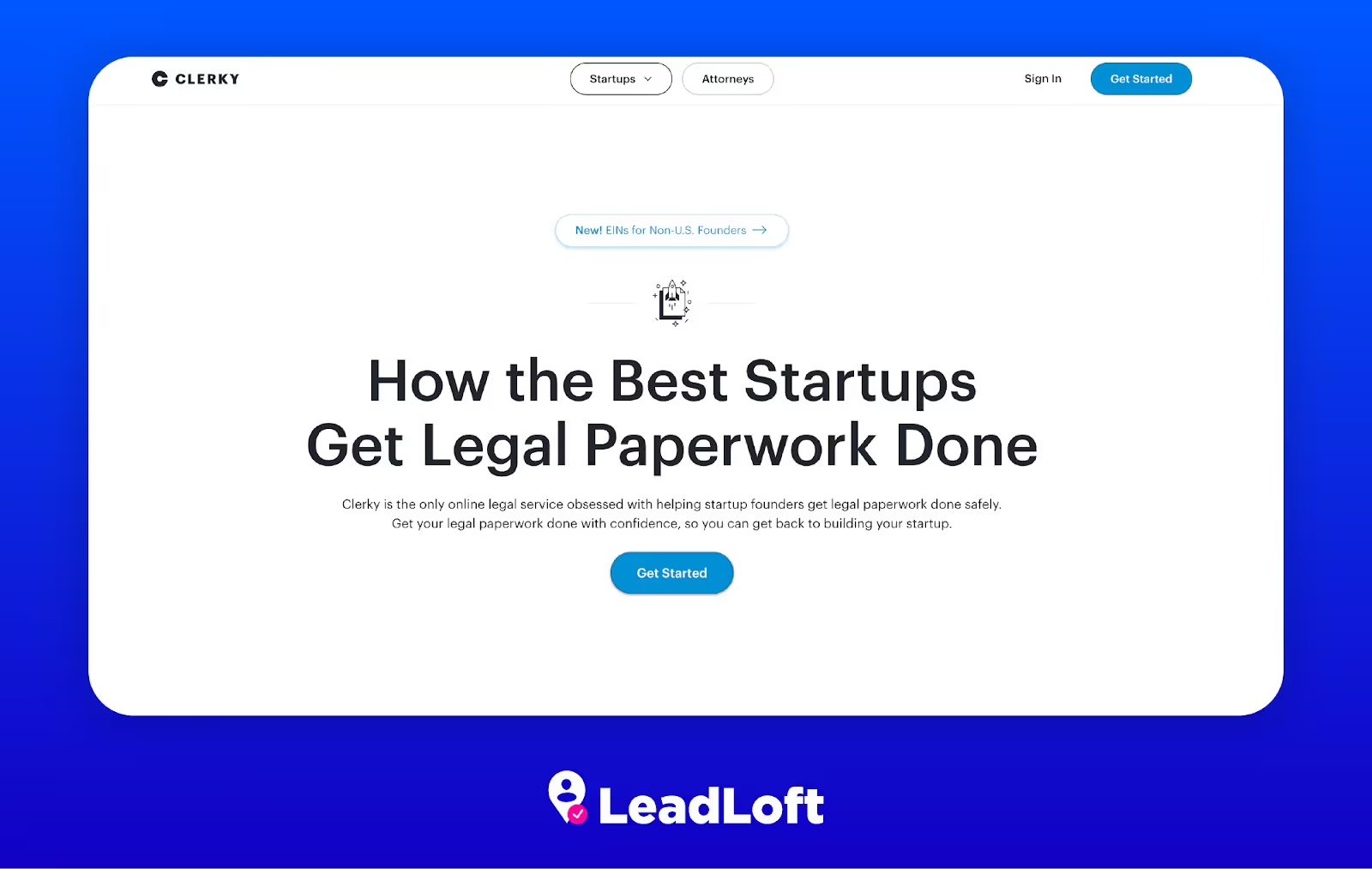How to Incorporate a Startup (The Right Way)


If you're reading this it likely means you're thinking about launching a startup.
That's exciting and you're already off to a good start by doing some research before getting started.
To give you some background, my name is Zack Olivas and I'm a founder here at LeadLoft. I've gone through the process of incorporating startups both the right and wrong way.
To make sure you don't make the same mistakes as me, let's run you through the best way to incorporate your startup and which software you should use to get the job done right.
Let's dive into it!
What is the “Right Way” to incorporate a Startup?
If you're building a startup, you're probably planning on raising capital at some point in the future.
This is where the "right way" comes into play. This is because investors are going to have expectations about your company's corporate structure and it’s best to align with those expectations before meeting with them.
What are the most important aspects of incorporation?
- Corporation Type
- State of Incorporation
- Founder Vesting Schedules
If you're just getting started with your startup, you likely have no idea what I'm talking about so let's break it down for you.
What’s the best Corporation structure for a startup?

The best corporation type for a startup looking to raise capital is a C Corporation.
This is because C Corporations can have an unlimited number of investors, making them the best structure to raise capital and go public.
But there are a variety of different corporations or company structures, so let’s cover them in depth so you understand why.
The most common corporation structures:
- C Corporation (C Corp)
- S Corporation (S Crop)
- Limited Liability Corporation (LLC)
From this list of corporation structures, investors are going to have the expectation that you are a C Corp. So, why is this the case? Well, there are really two big issues that S Corps and LLCs have.
S Corps can only have 100 shareholders. This makes it impossible for them to go public. As you're probably aware, VCs or investors are in the game of investing in companies that have the possibility of going public, making S Corps a deal breaker.
LLCs, on the other hand, don't have shares at all. Instead, LLCs have ownership percentages. This makes it extremely complicated when taking on new investors. Similar to S Corps, LLCs cannot go public, making LLC's a particularly bad option for startups looking to eventually raise capital.
So, if you're planning on raising capital, VCs and angel investors will expect your startup to be a C Corp.
What’s the best state to incorporate a startup in?

The best state to incorporate your startup in is Delaware. The vast majority of investors expect startups to incorporate in Delaware because it has a history of protecting investors and is known for its lenient tax laws for companies who don’t operate inside the state's borders.
It's such a common practice nowadays that if your startup is not incorporated in Delaware, investors may even ask you to migrate your state of incorporation to Delaware before they invest.
Nobody wants to go through this, so save time and incorporate in Delaware from the start.
What are founder vesting schedules?

Founder vesting schedules ensure that all founder ownership is vested over a period of time. This protects the startup in the case that one of the founders leaves early on, ensuring they don't take a significant portion of the startup with them.
This allows the founders still working for the organization to allocate ownership to a new founder or to share it between all shareholders. This helps ensure the founders feel as though they are working for themselves and are still motivated to grow the startup.
Thousands of teams have made the mistake of issuing outright ownership to all of their startup's founders. This becomes a massive problem if someone leaves after a few months or even just one year. Imagine a startup with three founders who all have equal ownership, and then one of the three founders leaves after two months.
Now, 33% of their company would belong to someone who's no longer working or contributing to their startup.
To avoid this, ensure you have founder vesting schedules set up. This operates similarly to employee stock options with a cliff and a vesting period, which usually lasts around four years. If anyone leaves before the four years are up, they'll either have no ownership or will own a fraction of the shares originally offered to them.
How to incorporate a startup?
In the past, incorporating a startup was actually quite complex. Many teams met with armies of lawyers to discuss and learn about the correct method for incorporating their startup.
That's clearly no longer the case today.
Nowadays, the structure investors have come to expect is so standard that there are tons of ways to easily and correctly incorporate a startup.This is commonly done with a few tools that handle everything for you.
Here are the two popular tools that we recommend researching:
1. Clerky

Website: clerky.com
Pricing: $400 (one-time payment) + Small Add-Ons
Highlights:
- Affordable Pay Per Use Pricing
- Delaware Incorporation
- Founder Vesting Schedules
- Registered Agent
- Cap Table Management
- Stock Option Management
- Great Guides
2.Gust

Website: gust.com
Pricing: $300/yr - $3k/yr
Highlights:
- Delaware Incorporation
- Founder Vesting Schedules
- Registered Agent
- Cap Table Management
- Stock Option Management
- Great Guides
Both of these tools are great, and I cannot recommend them enough. Just keep in mind that you might lack some customizability, because they are designed to offer boilerplate incorporation documents for startups looking to raise venture capital.
Common Questions on Startup Incorporation
1. What are the specific costs associated with incorporation?
The cost to incorporate a startup in the US range from $300 to $1,500 depending on your startup’s location.
The costs typically include state filing fees (these vary by state), legal fees if you hire a lawyer, a registered agent service fee (required in most states), and the cost of online incorporation tools.
You can learn more about this on Gusts website here.
2. Can I incorporate my startup myself, or do I need a lawyer?
You can incorporate a startup by yourself using online tools that streamline the process. It is recommended that you hire a lawyer who can provide valuable guidance, especially for more complex situations or if you want more customized legal documents.
3. Can I incorporate a company in the US if I’m located in a different country?
Anyone in the world can incorporate in Delaware assuming the country you reside in permits it. In fact, the process for you and US citizens to incorporate in the US are exactly the same and many Delaware Corporations are formed by non-US citizens.
However, International Business Law changes countries so it's best to Consult with a legal expert who specializes in international business law.
4. What's the difference between a 'cliff' and a 'vesting period' in founder vesting schedules?
A "cliff" is a set period (usually one year) where no shares vest at all. After the cliff, the "vesting period" dictates how the remaining shares are earned over time (commonly a four-year schedule).
5. Are there more alternatives to Clerky and Gust?
Yes, several other online platforms assist with incorporation. Some popular options include Stripe Atlas, LegalZoom, and Bizee (formerly IncFile). Research them to find one that aligns with your budget and specific needs.
Wrapping Up
There's a lot that you can do wrong when you're first incorporating a startup. However, if you're reading this article, it means you're already doing research to learn how to do it the right way, and that’s a great start.
If you have any questions on this topic, feel free to reach out to our team. While we cannot offer specific legal advice, we're more than happy to provide guidance where we can.





.avif)
